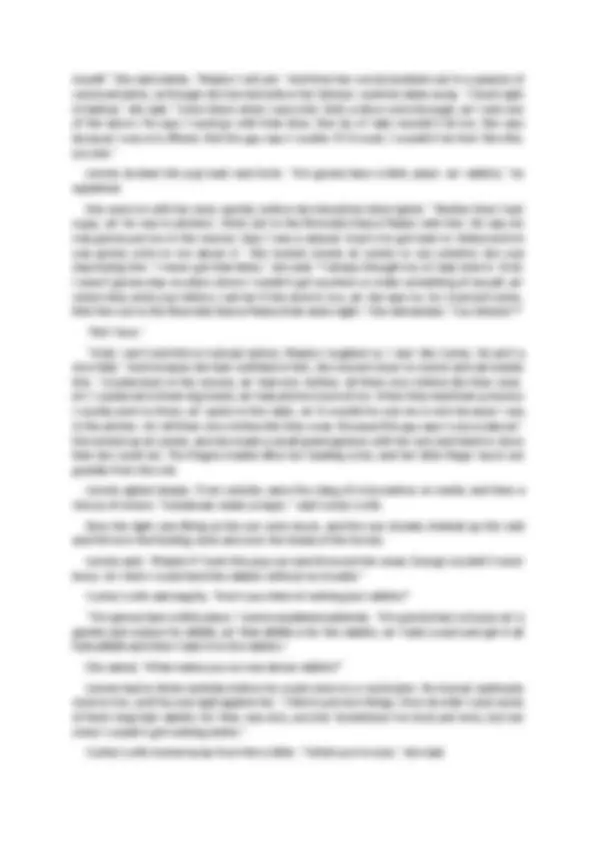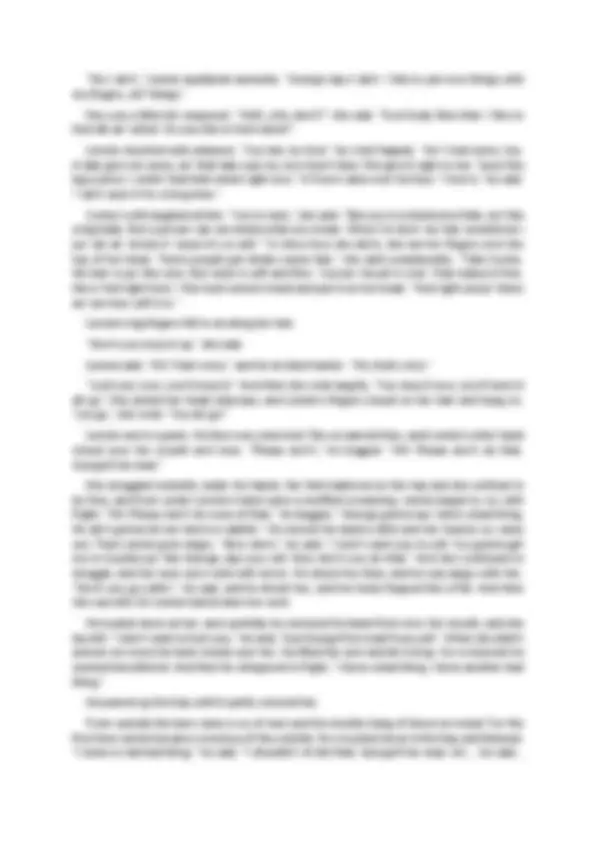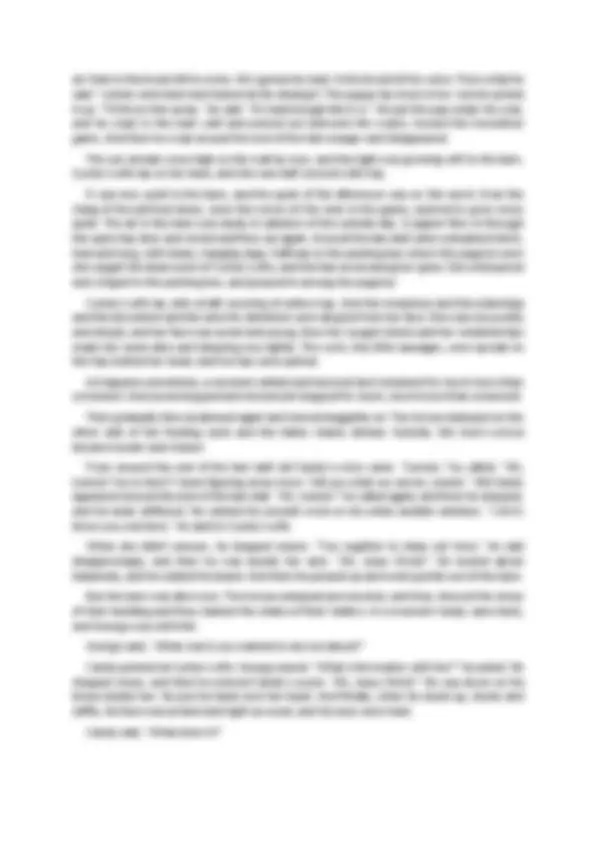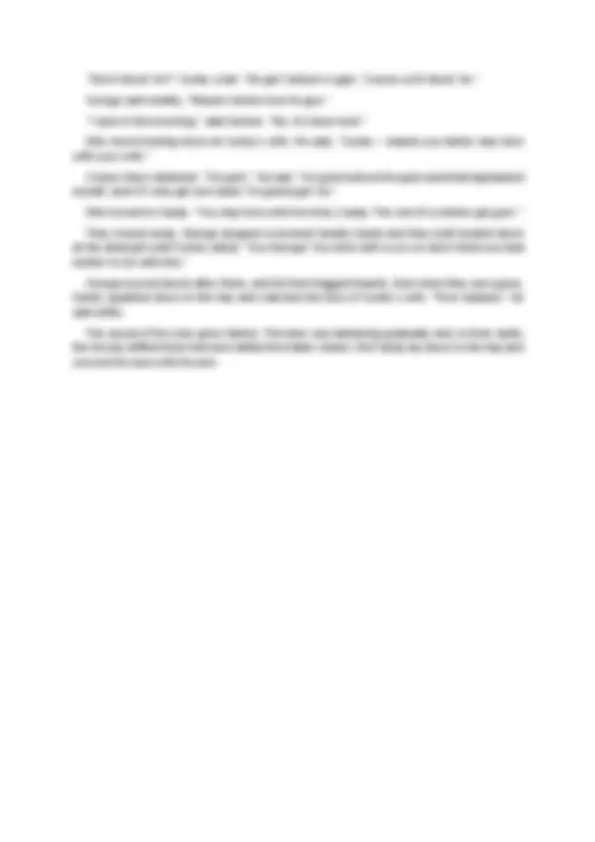






Study with the several resources on Docsity

Earn points by helping other students or get them with a premium plan


Prepare for your exams
Study with the several resources on Docsity

Earn points to download
Earn points by helping other students or get them with a premium plan
Community
Ask the community for help and clear up your study doubts
Discover the best universities in your country according to Docsity users
Free resources
Download our free guides on studying techniques, anxiety management strategies, and thesis advice from Docsity tutors
This chapter from 'Of Mice and Men' describes Lennie's discovery of a dead puppy in the barn and his interaction with Curley's wife. Lennie's desire to keep the puppy leads to a tragic event, and he is left to face the consequences. The scene also highlights Lennie's naivety and his longing for a place of his own.
Typology: Lecture notes
1 / 8

This page cannot be seen from the preview
Don't miss anything!





One end of the great barn was piled high with new hay and over the pile hung the four- taloned Jackson fork suspended from its pulley. The hay came down like a mountain slope to the other end of the barn, and there was a level place as yet unfilled with the new crop. At the sides the feeding racks were visible, and between the slats the heads of horses could be seen. It was Sunday afternoon. The resting horses nibbled the remaining wisps of hay, and they stamped their feet and they bit the wood of the mangers and rattled the halter chains. The afternoon sun sliced in through the cracks of the barn walls and lay in bright lines on the hay. There was the buzz of flies in the air, the lazy afternoon humming. From outside came the clang of horseshoes on the playing peg and the shouts of men, playing, encouraging, jeering. But in the barn it was quiet and humming and lazy and warm. Only Lennie was in the barn, and Lennie sat in the hay beside a packing case under a manger in the end of the barn that had not been filled with hay. Lennie sat in the hay and looked at a little dead puppy that lay in front of him. Lennie looked at it for a long time, and then he put out his huge hand and stroked it, stroked it clear from one end to the other. And Lennie said softly to the puppy, "Why do you got to get killed? You ain't so little as mice. I didn't bounce you hard." He bent the pup's head up and looked in its face, and he said to it, "Now maybe George ain't gonna let me tend no rabbits, if he fin's out you got killed." He scooped a little hollow and laid the puppy in it and covered it over with hay, out of sight; but he continued to stare at the mound he had made. He said, "This ain't no bad thing like I got to go hide in the brush. Oh! no. This ain't. I'll tell George I foun' it dead." He unburied the puppy and inspected it, and he stroked it from ears to tail. He went on sorrowfully, "But he'll know. George always knows. He'll say, 'You done it. Don't try to put nothing over on me.' An' he'll say, 'Now jus' for that you don't get to tend no rabbits!'" Suddenly his anger arose. "God damn you," he cried. "Why do you got to get killed? You ain't so little as mice." He picked up the pup and hurled it from him. He turned his back on it. He sat bent over his knees and he whispered, "Now I won't get to tend the rabbits. Now he won't let me." He rocked himself back and forth in his sorrow. From outside came the clang of horseshoes on the iron stake, and then a little chorus of cries. Lennie got up and brought the puppy back and laid it on the hay and sat down. He stroked the pup again. "You wasn't big enough," he said. "They tol' me and tol' me you wasn't. I di'n't know you'd get killed so easy." He worked his fingers on the pup's limp ear. "Maybe George won't care," he said. "This here God damn little son-of-a-bitch wasn't nothing to George." Curley's wife came around the end of the last stall. She came very quietly, so that Lennie didn't see her. She wore her bright cotton dress and the mules with the red ostrich feathers. Her face was made up and the little sausage curls were all in place. She was quite near to him before Lennie looked up and saw her. In a panic he shoveled hay over the puppy with his fingers. He looked sullenly up at her.
She said, "What you got there, sonny boy?" Lennie glared at her. "George says I ain't to have nothing to do with you- talk to you or nothing." She laughed. "George giving you orders about everything?" Lennie looked down at the hay. "Says I can't tend no rabbits if I talk to you or anything." She said quietly, "He's scared Curley'll get mad. Well, Curley got his arm in a sling- an' if Curley gets tough, you can break his other han'. You didn't put nothing over on me about gettin' it caught in no machine." But Lennie was not to be drawn. "No, sir. I ain't gonna talk to you or nothing." She knelt in the hay beside him. "Listen," she said. "All the guys got a horseshoe tenement goin' on. It's on'y about four o'clock. None of them guys is goin' to leave that tenement. Why can't I talk to you? I never get to talk to nobody. I get awful lonely." Lennie said, "Well, I ain't supposed to talk to you or nothing." "I get lonely," she said. "You can talk to people, but I can't talk to nobody but Curley. Else he gets mad. How'd you like not to talk to anybody?" Lennie said, "Well, I ain't supposed to. George's scared I'll get in trouble." She changed the subject. "What you got covered up there?" Then all of Lennie's woe came back on him. "Jus' my pup," he said sadly. "Jus' my little pup." And he swept the hay from on top of it. "Why, he's dead," she cried. "He was so little," said Lennie. "I was jus' playin' with him... an' he made like he's gonna bite me... an' I made like I was gonna smack him... an'... an' I done it. An' then he was dead." She consoled him. "Don't you worry none. He was jus' a mutt. You can get another one easy. The whole country is fulla mutts." "It ain't that so much," Lennie explained miserably. "George ain't gonna let me tend no rabbits now." "Why don't he?" "Well, he said if I done any more bad things he ain't gonna let me tend the rabbits." She moved closer to him and she spoke soothingly. "Don't you worry about talkin' to me. Listen to the guys yell out there. They got four dollars bet in that tenement. None of them ain't gonna leave till it's over." "If George sees me talkin' to you he'll give me hell," Lennie said cautiously. "He tol' me so." Her face grew angry. "Wha's the matter with me?" she cried. "Ain't I got a right to talk to nobody? Whatta they think I am, anyways? You're a nice guy. I don't know why I can't talk to you. I ain't doin' no harm to you." "Well, George says you'll get us in a mess." "Aw, nuts!" she said. "What kinda harm am I doin' to you? Seems like they ain't none of them cares how I gotta live. I tell you I ain't used to livin' like this. I coulda made somethin' of
"No I ain't," Lennie explained earnestly. "George says I ain't. I like to pet nice things with my fingers, sof' things." She was a little bit reassured. "Well, who don't?" she said. "Ever'body likes that. I like to feel silk an' velvet. Do you like to feel velvet?" Lennie chuckled with pleasure. "You bet, by God," he cried happily. "An' I had some, too. A lady give me some, an' that lady was my own Aunt Clara. She give it right to me- 'bout this big a piece. I wisht I had that velvet right now." A frown came over his face. "I lost it," he said. "I ain't seen it for a long time." Curley's wife laughed at him. "You're nuts," she said. "But you're a kinda nice fella. Jus' like a big baby. But a person can see kinda what you mean. When I'm doin' my hair sometimes I jus' set an' stroke it 'cause it's so soft." To show how she did it, she ran her fingers over the top of her head. "Some people got kinda coarse hair," she said complacently. "Take Curley. His hair is jus' like wire. But mine is soft and fine. 'Course I brush it a lot. That makes it fine. Here- feel right here." She took Lennie's hand and put it on her head. "Feel right aroun' there an' see how soft it is." Lennie's big fingers fell to stroking her hair. "Don't you muss it up," she said. Lennie said, "Oh! That's nice," and he stroked harder. "Oh, that's nice." "Look out, now, you'll muss it." And then she cried angrily, "You stop it now, you'll mess it all up." She jerked her head sideways, and Lennie's fingers closed on her hair and hung on. "Let go," she cried. "You let go!" Lennie was in a panic. His face was contorted. She screamed then, and Lennie's other hand closed over her mouth and nose. "Please don't," he begged. "Oh! Please don't do that. George'll be mad." She struggled violently under his hands. Her feet battered on the hay and she writhed to be free; and from under Lennie's hand came a muffled screaming. Lennie began to cry with fright. "Oh! Please don't do none of that," he begged. "George gonna say I done a bad thing. He ain't gonna let me tend no rabbits." He moved his hand a little and her hoarse cry came out. Then Lennie grew angry. "Now don't," he said. "I don't want you to yell. You gonna get me in trouble jus' like George says you will. Now don't you do that." And she continued to struggle, and her eyes were wild with terror. He shook her then, and he was angry with her. "Don't you go yellin'," he said, and he shook her; and her body flopped like a fish. And then she was still, for Lennie had broken her neck. He looked down at her, and carefully he removed his hand from over her mouth, and she lay still. "I don't want to hurt you," he said, "but George'll be mad if you yell." When she didn't answer nor move he bent closely over her. He lifted her arm and let it drop. For a moment he seemed bewildered. And then he whispered in fright, "I done a bad thing. I done another bad thing." He pawed up the hay until it partly covered her. From outside the barn came a cry of men and the double clang of shoes on metal. For the first time Lennie became conscious of the outside. He crouched down in the hay and listened. "I done a real bad thing," he said. "I shouldn't of did that. George'll be mad. An'... he said...
an' hide in the brush till he come. He's gonna be mad. In the brush till he come. Tha's what he said." Lennie went back and looked at the dead girl. The puppy lay close to her. Lennie picked it up. "I'll throw him away," he said. "It's bad enough like it is." He put the pup under his coat, and he crept to the barn wall and peered out between the cracks, toward the horseshoe game. And then he crept around the end of the last manger and disappeared. The sun streaks were high on the wall by now, and the light was growing soft in the barn. Curley's wife lay on her back, and she was half covered with hay. It was very quiet in the barn, and the quiet of the afternoon was on the ranch. Even the clang of the pitched shoes, even the voices of the men in the game, seemed to grow more quiet. The air in the barn was dusky in advance of the outside day. A pigeon flew in through the open hay door and circled and flew out again. Around the last stall came a shepherd bitch, lean and long, with heavy, hanging dugs. Halfway to the packing box where the puppies were she caught the dead scent of Curley's wife, and the hair arose along her spine. She whimpered and cringed to the packing box, and jumped in among the puppies. Curley's wife lay with a half-covering of yellow hay. And the meanness and the plannings and the discontent and the ache for attention were all gone from her face. She was very pretty and simple, and her face was sweet and young. Now her rouged cheeks and her reddened lips made her seem alive and sleeping very lightly. The curls, tiny little sausages, were spread on the hay behind her head, and her lips were parted. As happens sometimes, a moment settled and hovered and remained for much more than a moment. And sound stopped and movement stopped for much, much more than a moment. Then gradually time awakened again and moved sluggishly on. The horses stamped on the other side of the feeding racks and the halter chains clinked. Outside, the men's voices became louder and clearer. From around the end of the last stall old Candy's voice came. "Lennie," he called. "Oh, Lennie! You in here? I been figuring some more. Tell you what we can do, Lennie." Old Candy appeared around the end of the last stall. "Oh, Lennie!" he called again; and then he stopped, and his body stiffened. He rubbed his smooth wrist on his white stubble whiskers. "I di'n't know you was here," he said to Curley's wife. When she didn't answer, he stepped nearer. "You oughten to sleep out here," he said disapprovingly; and then he was beside her and- "Oh, Jesus Christ!" He looked about helplessly, and he rubbed his beard. And then he jumped up and went quickly out of the barn. But the barn was alive now. The horses stamped and snorted, and they chewed the straw of their bedding and they clashed the chains of their halters. In a moment Candy came back, and George was with him. George said, "What was it you wanted to see me about?" Candy pointed at Curley's wife. George stared. "What's the matter with her?" he asked. He stepped closer, and then he echoed Candy's words. "Oh, Jesus Christ!" He was down on his knees beside her. He put his hand over her heart. And finally, when he stood up, slowly and stiffly, his face was as hard and tight as wood, and his eyes were hard. Candy said, "What done it?"
Outside the noise of the game stopped. There was a rise of voices in question, a drum of running feet and the men burst into the barn. Slim and Carlson and young Whit and Curley, and Crooks keeping back out of attention range. Candy came after them, and last of all came George. George had put on his blue denim coat and buttoned it, and his black hat was pulled down low over his eyes. The men raced around the last stall. Their eyes found Curley's wife in the gloom, they stopped and stood still and looked. Then Slim went quietly over to her, and he felt her wrist. One lean finger touched her cheek, and then his hand went under her slightly twisted neck and his fingers explored her neck. When he stood up the men crowded near and the spell was broken. Curley came suddenly to life. "I know who done it," he cried. "That big son-of-a-bitch done it. I know he done it. Why- ever'body else was out there playin' horseshoes." He worked himself into a fury. "I'm gonna get him. I'm going for my shotgun. I'll kill the big son-of-a-bitch myself. I'll shoot 'im in the guts. Come on, you guys." He ran furiously out of the barn. Carlson said, "I'll get my Luger," and he ran out too. Slim turned quietly to George. "I guess Lennie done it, all right," he said. "Her neck's bust. Lennie coulda did that." George didn't answer, but he nodded slowly. His hat was so far down on his forehead that his eyes were covered. Slim went on, "Maybe like that time in Weed you was tellin' about." Again George nodded. Slim sighed. "Well, I guess we got to get him. Where you think he might of went?" It seemed to take George some time to free his words. "He- would of went south," he said. "We come from north so he would of went south." "I guess we gotta get 'im," Slim repeated. George stepped close. "Couldn' we maybe bring him in an' they'll lock him up? He's nuts, Slim. He never done this to be mean." Slim nodded. "We might," he said. "If we could keep Curley in, we might. But Curley's gonna want to shoot 'im. Curley's still mad about his hand. An' s'pose they lock him up an' strap him down and put him in a cage. That ain't no good, George." "I know," said George, "I know." Carlson came running in. "The bastard's stole my Luger," he shouted. "It ain't in my bag." Curley followed him, and Curley carried a shotgun in his good hand. Curley was cold now. "All right, you guys," he said. "The nigger's got a shotgun. You take it, Carlson. When you see 'um, don't give 'im no chance. Shoot for his guts. That'll double 'im over." Whit said excitedly, "I ain't got a gun." Curley said, "You go in Soledad an' get a cop. Get Al Wilts, he's deputy sheriff. Le's go now." He turned suspiciously on George. "You're comin' with us, fella." "Yeah," said George. "I'll come. But listen, Curley. The poor bastard's nuts. Don't shoot 'im. He di'n't know what he was doin'."
"Don't shoot 'im?" Curley cried. "He got Carlson's Luger. 'Course we'll shoot 'im." George said weakly, "Maybe Carlson lost his gun." "I seen it this morning," said Carlson. "No, it's been took." Slim stood looking down at Curley's wife. He said, "Curley – maybe you better stay here with your wife." Curley's face reddened. "I'm goin'," he said. "I'm gonna shoot the guts outa that big bastard myself, even if I only got one hand. I'm gonna get 'im." Slim turned to Candy. "You stay here with her then, Candy. The rest of us better get goin'." They moved away. George stopped a moment beside Candy and they both looked down at the dead girl until Curley called, "You George! You stick with us so we don't think you had nothin' to do with this." George moved slowly after them, and his feet dragged heavily. And when they were gone, Candy squatted down in the hay and watched the face of Curley's wife. "Poor bastard," he said softly. The sound of the men grew fainter. The barn was darkening gradually and, in their stalls, the horses shifted their feet and rattled the halter chains. Old Candy lay down in the hay and covered his eyes with his arm.